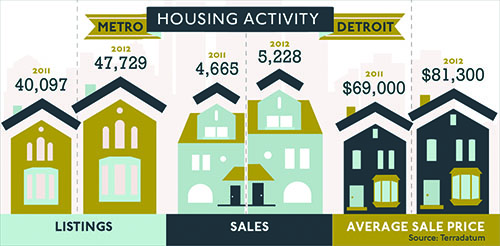The resurgence of employment in downtown Detroit — led by General Motors Co., Quicken Loans Inc., Compuware Corp., Strategic Staffing Solutions, and others — has created new demand for housing in the city.
When the David Broderick Tower, located a block from Comerica Park, reopened last fall following a $53-million restoration, all of the 125 apartments were quickly leased.
In turn, housing incentives provided by Blue Cross Blue Shield of Michigan, Wayne State University, and the Detroit Medical Center have spurred strong demand for single-family homes, condominiums, and apartments in downtown Detroit’s near-lying districts: Lafayette Park, Midtown, and Corktown, along with historic neighborhoods like Indian Village.
The revival has encouraged RE/MAX of Southeastern Michigan, which in 2012 was the top residential real estate company in the region, to move toward opening a sales office in downtown Detroit. “We’re ready to do it, we just need to find the right franchisee with strong financial backing and a good business plan,” says Jeanette Schneider, regional vice president of RE/MAX, based in Northville.
“We project home inventories will remain low throughout the region as the local economy continues to recover,” Schneider says. “There are still short sales and foreclosures, but they’ve started to slow down. The starter home market has been very steady, and we are seeing more activity from move-up buyers as people recognize that low mortgage interest rates won’t be around forever.”
Meanwhile, the luxury segment of the region’s housing market — homes priced above $500,000 — continues to be slow, based on sales activity, although prices continue to rise. Last December, the average sales price for a luxury home in the five Grosse Pointe markets was $625,000, up from $535,000 in December 2011, Schneider says. In Bloomfield Hills, the average sales price was $676,000 — up from $650,000 — in the same time periods.
Mortgage rates in the region average near 3.2 percent for a 30-year fixed in early 2013, with a low of 2.9 percent from Gold Star Mortgage Financial Group (2.1 points), according to Residential Mortgage Consultants Inc. in Brighton.
While Michigan legislators created numerous laws at the close of last year, Proposal A, the school finance reform measure which voters approved in 1994, was left unchanged. Under the measure, annual assessment increases were limited to 5 percent or the rate of inflation, whichever is less. However, when a property is sold or transferred, the assessment is adjusted to a home’s current value.
The law, real estate agents say, has held down home sales as would-be sellers stay in their current homes as long as possible, to avoid higher assessments in the event they acquire another residence. “The housing market is on the road to recovery, and while homes are reassessed under Prop A, growing families and people looking to downsize are still driving demand,” Schneider says. db












